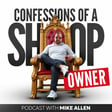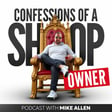
Ep 14 - Harrison Rusk & Richard Gautier | Deep Thoughts From Texas
So...I'm not good at marketing. Some people tell me I am, but to me, it's not a strong suit of mine. Plus, I don't have the time to do it even if I thought I was good. So, I use Turnkey Marketing. They're great. Find out for yourself HERE
Today's episode I recorded at an Elite Worldwide event in Dallas with two people I know through a peer group I'm in at Elite. So, it's safe to say I'm a big proponent of their coaching services. So, yeah, I think the least you should do is look them up. Do that HERE
I talk about them all the time, because without them, I'm not sure where I'd be as a shop owner. Tekmetric has made my shop what it is. You should use them. Would I steer you wrong? Learn more HERE
Richard worked at a dealership for years, now he owns a repair shop. How did that happen? He tells me today. Harrison is a second-generation shop owner like me, and we talk about the things we've learned and mistakes we've made. Hopefully, so you won't follow in our footsteps. We also drink whiskey with ice.
00:00 Elite Ignite 2025 Kickoff Night
06:35 65-Year-Old Outspeeds Indoor Kart Enthusiast
08:01 Energetic Entrepreneur Defies Age
11:56 Building Business Skills Toolbox
14:22 Customer-Focused Service Mindset
17:35 "Great Environments Breed Success"
22:08 Neglected Auditing in Business Management
23:51 "Process Importance in Problem Solving"
28:15 Leadership and Growth Challenges
31:55 Learning from Challenging Experiences
33:56 "Building Business Culture and Team"
38:29 Delegation Fuels Business Growth
41:53 "Managing Expectations to Prevent Resentment"
43:54 Addressing Performance Expectations and Accountability
49:32 Self-Sabotage Limits Success
51:07 Employee Growth and Accountability Steps
53:56 Early Morning Riser

